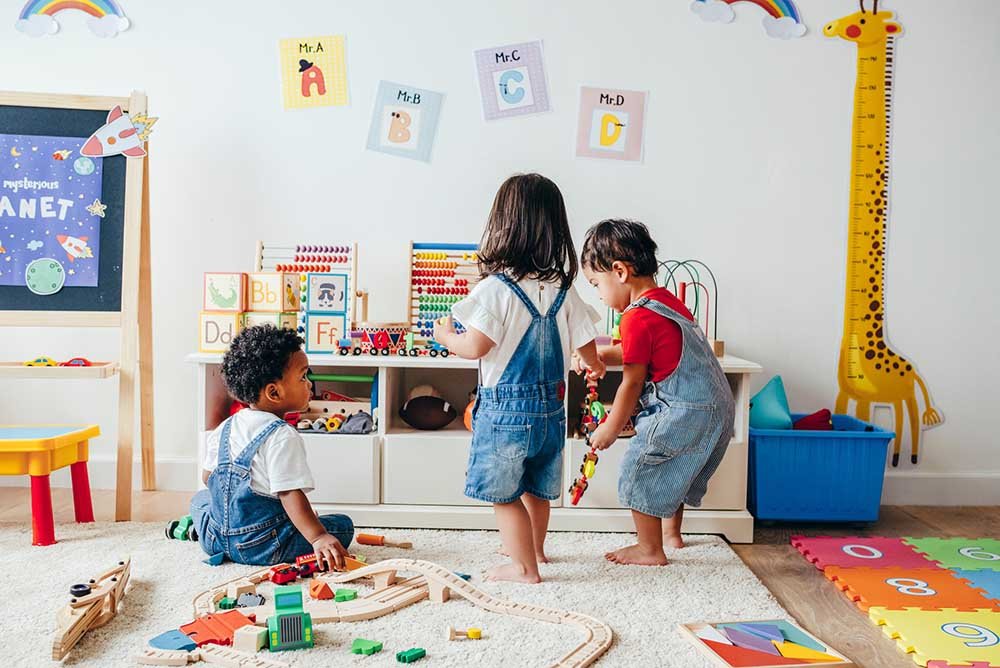Has it ever crossed your mind that practice sword fights, block towers, dress up escapades, and even backyard mud pie wars are secretly child development powerhouses in disguise? Play serves as what renowned psychologist Lev Vygotsky coined a ‘zone of proximal development’ where all sorts of emerging abilities are nurtured organically.
Through play, kids intuitively advance motor control, emotional regulation, communication, creativity, critical thinking, and confidence without it feeling like regimented learning. As parents and educators hoping to maximize every child’s unique potential, it’s your job to embrace play as the enriching development rocket fuel it truly is.
With that in mind, here’s why play matters at each age and how to harness its power to positively shape your little ones.
Play fosters cognitive development
Say your child is trying to construct a castle out of Magna-Tiles but can’t get the pieces to align properly. Their brain has to tackle concepts like geometry and physics to test new structural solutions.
The mental flexibility built through these types of joyful play is what prepares little minds to later tackle more complex academic or real-world challenges. So, encourage play opportunities that get your kiddo thinking on their toes – puzzles, building sets, board games, or any activities where they can let their creativity run wild.
A good way to get this right? Take them to preschool Belmore or similar reputable institutions near you. Quality educators can help nurture them into the cognitive and physical powerhouse they’re meant to be.
Emotional growth through play
Play also serves as a valuable outlet for children to safely process, understand, and communicate complex emotions. Assigning feelings and experiences to toys or stories allows them to express vulnerabilities they may not be comfortable articulating directly.
A child directing a scene where Lego figures comfort each other after a nightmare reveals their own desire to feel protected. Or intense dinosaur battles with happy resolutions can help youngsters release frustration, then regain calm.
Additionally, trying on various social roles and personas during play builds self-confidence and resilience. A timid child gains courage sticking up for dolls being bullied. While more dramatic kids find balance emoting through vibrant invented characters.
Importance of physical play for health and development
When kids are zipping down slides, scrambling across monkey bars, kicking balls, or inventing backyard games like zombie tag, they’re picking up some major health perks. Letting them run wild, testing their speed and agility in races, or trying out dance moves builds crucial gross motor skills.
Activities like LEGO building, coloring, playing instruments, or even finger painting advance hand-eye coordination, aka fine motor skills. Physical play quite literally shapes healthy neural connections and muscle memory.
So be sure to balance screen time and sedentary activities with plenty of opportunities for active play, both structured and unstructured.
Play and language development

As children interact with toys, friends, stories, or even imaginary characters, they intuitively practice expressing thoughts verbally and absorbing new vocabulary. Walker ages are especially impressionable as little ones start linking words and symbols to real objects and actions happening around them.
Encourage play activities that involve rich descriptive language, such as pretending to be at a restaurant or store using toy kitchen sets. To encourage your toddler’s speech, try reading picture books together and then ask engaging questions about the story. Similarly, getting a digital keyboard like one of these can be a fun way to spark interest in music and develop fine motor skills, adding another layer to their learning and development.
School-aged kids will devour new words and phrases through vibrant conversations with peers during play dates or recess games. The social and learning components of play create natural opportunities for children to strengthen verbal fluency, expand their lexicon, and pick up on linguistic rules.
Adapting play for children with special needs
Kids with special needs or disabilities can face barriers to accessing play.
For example, outdoor playgrounds often don’t accommodate various mobility aids, which limits full participation. Create access by adding adaptive swings and surfaces friendly for crutches, walkers, or wheelchairs throughout parks and schools.
Also, provide sensory play options like sandbox digging or water bead sensory bins for kids with autism benefiting from tactile input. Even adapting classic games to be less competitive and more collaborative can allow for enjoyable, inclusive play.
The goal is crafting a play culture that recognizes each child’s strengths and removes avoidable constraints. Because the developmental, social, and emotional power of play should be available for all kids!
In closing
Through play, young minds bloom, ready to ignite the world with compassion and vision. Your role as a parent is to nurture the playgrounds – both real and imagined – where this brilliant metamorphosis unfolds each day.
Trust in the power of play. Allow silliness, foster friendships, provide props, give guidance, then step aside and observe imagination awakening. Wherever children are free to leap and laugh together, life-shaping growth will happen.


